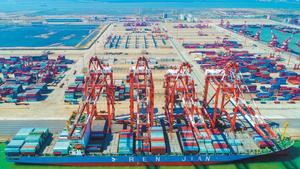 This undated photo shows the container port of the Nansha Free Trade Area in Guangzhou, capital of Guangdong province. (PHOTO / CHINA DAILY)
This undated photo shows the container port of the Nansha Free Trade Area in Guangzhou, capital of Guangdong province. (PHOTO / CHINA DAILY)
Increased imports from the United States will not reduce China's import volume from other countries after the signing of the first-phase economic and trade agreement between China and the US, a senior customs official said on Tuesday.
China has a large and diversified market and Sino-US trade will make new progress on the basis of mutual benefit after the signing of the agreement, which will help the two countries and the whole world, Zou Zhiwu, vice-minister of the General Administration of Customs, said at a news conference in Beijing.
Imports from the US saw a recovery in growth from November to December. In particular, US shipments to China rose 9.1 percent year-on-year to 78.83 billion yuan (US$11.46 billion) in December.
China has a large and diversified market and Sino-US trade will make new progress on the basis of mutual benefit after the signing of the agreement, which will help the two countries and the whole world, Zou Zhiwu, vice-minister of the General Administration of Customs, said
ALSO READ: China lifts restrictions on US poultry imports
Exports of US agricultural products to China reached 14.1 billion yuan last month, jumping 200 percent year-on-year, while China imported 23,000 automobiles from the US, an increase of 150 percent from the same period a year earlier.
The official made the remarks as a Chinese delegation, led by Vice-Premier Liu He, arrived in Washington for the signing of a phase-one trade agreement at the White House, scheduled for Wednesday.
The Sino-US trade tension has not only put pressure on domestic manufacturers, but also caused difficulties for other global companies trading with the US, he said.
Affected by the 22-month-long bilateral trade tussle, Sino-US trade fell by 10.7 percent to 3.73 trillion yuan in 2019.
Although China's exports to the US have declined, domestic businesses have made notable progress in exporting to new markets in other parts of the world, Zou said, stressing that the country's foreign trade remains resilient as the national economy remains on track.
China's foreign trade volume stood at 31.54 trillion yuan in 2019, growing 3.4 percent year-on-year, according to the GAC data.
ALSO READ: Private firms lead China's imports, exports for first time
The country's exports rose 5 percent to 17.23 trillion yuan and imports grew by 1.6 percent to 14.31 trillion yuan last year, while its trade surplus increased by 25.4 percent to 2.92 trillion yuan.
In the meantime, the European Union, the Association of Southeast Asian Nations, the US and Japan remained China's top four trading partners.
In addition to the accelerated negotiation pace of the Regional Comprehensive Economic Partnership and free trade agreement among China, Japan and South Korea, China should seal more free trade deals with economies related to the Belt and Road Initiative, said Wei Jianguo, vice-chairman of the China Center for International Economic Exchanges. China can also further boost bilateral trade with Russia through enhanced energy and farm product trade, he said.
China's trade with economies related to the BRI reached 9.27 trillion yuan last year, up by 10.8 percent year-on-year, 7.4 percentage points higher than its overall trade volume growth.
READ MORE: China delivers on promise to expand imports
The expanded trade has benefited enterprises in both China and economies related to the BRI.
Yadea Technology Group Co Ltd, a major manufacturer of two-wheeled electric vehicles, or EVs, is one of Chinese firms that are keen to grow their global sales by adding new stores, plants and distributors in markets participating in the BRI.
Many opportunities come from a number of countries including Germany, South Korea, India and Indonesia, where there is an ongoing effort to cut energy use and pollution, and pursue sustainable development, said Dong Jinggui, chairman of Yadea, a major producer of electric bikes based in Wuxi, Jiangsu province.


